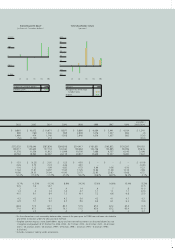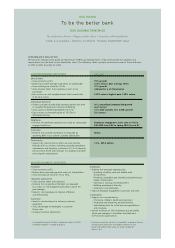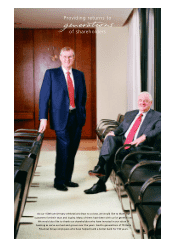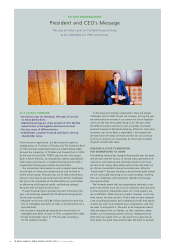TD Bank 2005 Annual Report Download - page 14
Download and view the complete annual report
Please find page 14 of the 2005 TD Bank annual report below. You can navigate through the pages in the report by either clicking on the pages listed below, or by using the keyword search tool below to find specific information within the annual report.
TD BANK FINANCIAL GROUP ANNUAL REPORT 2005 Statement of Corporate Governance Practices
10
William E. Bennett
Corporate Director and Retired
President and
Chief Executive Officer
Draper & Kramer, Inc.
Chicago, Illinois
Hugh J. Bolton
Chair of the Board
EPCOR Utilities Inc.
Edmonton, Alberta
John L. Bragg
Chairman, President and
Co-Chief Executive Officer
Oxford Frozen Foods Limited
Oxford, Nova Scotia
W. Edmund Clark
President and
Chief Executive Officer
The Toronto-Dominion Bank
Toronto, Ontario
Marshall A. Cohen
Counsel
Cassels Brock & Blackwell LLP
Toronto, Ontario
Wendy K. Dobson
Professor and Director
Institute for International Business
Joseph L. Rotman School of
Management, University of Toronto
Toronto, Ontario
Darren Entwistle
President and
Chief Executive Officer
TELUS Corporation
Vancouver, British Columbia
Donna M. Hayes
Publisher and Chief Executive Officer
Harlequin Enterprises Limited
Toronto, Ontario
Henry H. Ketcham
Chairman of the Board, President
and Chief Executive Officer
West Fraser Timber Co. Ltd.
Vancouver, British Columbia
Pierre H. Lessard
President and Chief Executive Officer
METRO INC.
Montréal, Québec
Harold H. MacKay
Counsel
MacPherson Leslie & Tyerman LLP
Regina, Saskatchewan
Brian F. MacNeill
Chairman of the Board
Petro-Canada
Calgary, Alberta
Roger Phillips
Corporate Director and Retired
President and Chief Executive Officer
IPSCO Inc.
Regina, Saskatchewan
Wilbur J. Prezzano
Corporate Director and
Retired Vice Chairman
Eastman Kodak Company
Charleston, South Carolina
William R. Ryan
Chairman, President and
Chief Executive Officer
TD Banknorth
Portland, Maine
Vice Chair and Group Head, U.S.
Personal and Commercial Banking,
The Toronto-Dominion Bank
Toronto, Ontario
Helen K. Sinclair
Chief Executive Officer
BankWorks Trading Inc.
Toronto, Ontario
John M. Thompson
Chairman of the Board
The Toronto-Dominion Bank
Toronto, Ontario
*as of December 1, 2005
THE BOARD OF DIRECTORS
WHO ARE THEY?
Our directors* are listed below. Our Proxy Circular for the 2006
Annual Meeting will set out the director candidates proposed for
election at the meeting and additional information about each
candidate including education, other principal directorships,
TDBFG committee membership, stock ownership and attendance
at Board and committee meetings.
WHATARE THE BOARD’S MAIN RESPONSIBILITIES?
The Board is responsible for overseeing our management and
business affairs and approving strategic plans and major policy
decisions for TDBFG. Each year there is a Board strategy session
and strategic matters are otherwise discussed frequently and
thoroughly at Board meetings. The Board is also responsible for
setting the tone for a culture of integrity and compliance
throughout the Bank and, in that regard, expects the highest
level of personal and professional integrity from the President
and CEO and other executive officers of TDBFG. The Board
operates under a written charter describing in plain language its
key responsibilities.
Under its Charter, the Board’s main responsibilities include
providing the supervision necessary for:
1. Disclosure of reliable and timely information to shareholders:
•The shareholders depend on the Board to get them the right
information.
2. Approval of strategy and major policy decisions of TDBFG:
•The Boardmust understand and approve where TDBFG is
going, be kept current on its progress towards those
objectives and be part of and approve any major decisions.
3. Evaluation, compensation and succession for key management
roles:
•The Board must be sure that the key roles have the right
people, that they are monitored and evaluated by the Board
and that they are appropriately compensated to encourage
TDBFG’s long-term success.
4. Oversight of the management of risks and the implementation
of internal controls:
•The Board must be satisfied that the assets of TDBFG are
protected and that there are sufficient internal checks
and balances.
5. Effective Board governance:
•To excel in their duties, the Board needs to be functioning
properly as a Board – strong members with the right skills
and the right information.
WHAT ARE THE DIRECTORS’ KEY OBJECTIVES?
In addition to having the requisite skills and experience, all non-
management directors must meet the qualifications for directors
set out in the Position Description for Directors of TDBFG. Under
the Position Description, directors are expected to serve TDBFG
and the long-term interests of its shareholders by supervising the
management of the business and affairs of TDBFG. In doing so,
the directors are expected to:
•Meet the highest ethical and fiduciary standards;
•Demonstrate independence from management;
•Be knowledgeable and inquisitive about the issues facing
TDBFG;
•Apply good sense and sound judgment to help make wise
decisions; and
•Display commitment through attendance at, preparation for
and participation in meetings.
Directors are expected to fulfill these objectives through
accountability, integrity, independence, involvement, contribu-
tion and commitment to the Bank and its shareholders.
HOW ARE DIRECTORS SELECTED?
Each year, the Board recommends the director nominees to
shareholders and the shareholders can vote on each new director
nominee. The Corporate Governance Committee has the respon-
sibility to determine what skills, qualities and backgrounds the
Board needs to fulfill its many responsibilities with a view to
diverse representation on the Board. It seeks candidates to fill
any gaps in the skills, qualities and backgrounds of Board
members and rigorously assesses a candidate’s ability to make a
valuable contribution to the Board. The Corporate Governance
Committee also regularly assesses the needs of the Boardand its
committees, including the competencies and skills the Board
considers to be necessary for the Board, as a whole, to possess;
the competencies and skills that the Board considers each
existing director to possess; and the competencies and skills
each new nominee will bring to the Board.
All directors are encouraged to identify possible candidates to
join the Board. In addition, the Corporate Governance Committee
has engaged independent consultants to help identify candidates
who meet the qualifications being sought (including considera-
tion of whether or not each new nominee can devote sufficient
time and resources to his or her duties as a Board member) and
to ensure that the Committee is considering a large and diverse
pool of talent. The Committee is also responsible for assessing the
contribution of the current directors to determine if they should
be recommended for re-election. Some factors considered by the
Committee and the Board include:
•The director’s record of attendance.
•Whether the director has had a material change in his or her
circumstances, such as a change of principal occupation, in
which case the director must resign (the Boardwill decide to
accept or reject the director’s resignation).
•Other significant changes in the ability of a director to
contribute to the Board.
























